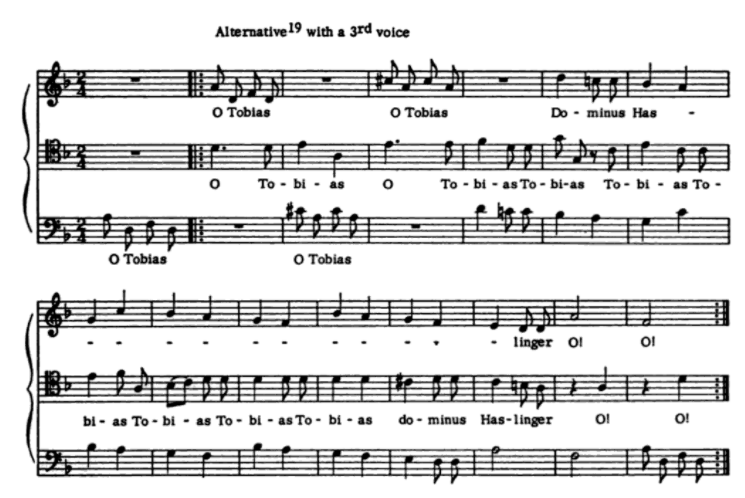On 10 September 1821, Beethoven wrote to Tobias Haslinger, at the time an employee of the music publisher Steiner. Beethoven enjoyed joking with Tobias Haslinger, and he told his friend about a dream he had while in a carriage between Vienna and Baden:
Now while I was dozing I dreamt that I was travelling to very distant parts of the world, even to Syria and, in fact, to India and back again, and even to Arabia; and in the end I even got as far as Jerusalem. The Holy City made my thoughts turn to the sacred books. So it is no wonder that I then began to think of that fellow Tobias; and naturally, our little Tobias [Tobiasserl in original] also and his pertobiassing [pertobiasser] had to cross my mind. Whereupon during my dream journey the following canon occurred to me:

As soon as I awoke, however, the canon had vanished and not one note of it could I recall. But on the following day as I was driving back here in the same vehicle (that of a poor Austrian musical drudge) and was continuing yesterday’s dream journey while awake behold, in accordance with the law of association of ideas, the same canon occurred to me. This time, as I was awake, I held on to it, as Menelaus frequently did to Proteus [in Homer’s Odyssey], and only allowed it to transform itself into three parts.

This canon has been catalogued as WoO 182. The original letter can be viewed on the Beethoven-Haus site, although the pages are not presented in consecutive order:
#Beethoven250 Day 322
Canon “O Tobias” (WoO 182), 1821
A studio recording with animated score.
In his essay “The Dreams of Beethoven” (reprinted in Beethoven Essays), Maynard Solomon asserts that Beethoven’s letter to Tobias Haslinger references the Biblical character from the Book of Tobit:
Tobias (of the Apocryphal Book of Tobit) is sent on a mythic quest by his blind father against the wishes of his mother. Protected by the angel Raphael, he conquers the devouring sea-monster and marries Sara, whose nuptial bed has been the deathbed of seven previous bridegrooms. Laden with wealth, he returns home and cures the blindness of his father, who bless his son and foretells both the glory and the ruin of Jerusalem. The contours of this mythic pattern are those of Beethoven’s dream itself: exile, quest, escape from phallic dangers (Proteus), conquest of the exotic witch-bride (Helen, wife of Menelaus), return to the homeland (Jerusalem, Ithaca, Bonn), reunion with the mother, and ultimately recognition of the father, which permits the hero to take his place among the elders.
Finally, in this dream Beethoven breaks into song: there is lively music, the canon that “came to me” during “my dream journey.” … The “creativity” of Beethoven’s Haslinger dream may express his joy at the loosening of his bondage to his fantasies, at the imminence of a breakthrough.
In a review of Solomon’s Beethoven Essays, musicologist Kevin Korsyn dissects Beethoven’s letter and the canon, and concludes that it’s a joke, and that Solomon’s psychoanalytical treatment is “unconvincing.”
#Beethoven250 Day 322
Canon “O Tobias” (WoO 182), 1821
This is a rare live performance, but somebody didn’t press the Record button soon enough.
To Franz Brentano on 12 November 1821, Beethoven wrote:
Beloved Friend! Please don’t think me a rogue or a thoughtless genius — Since last year and until now I have been constantly ill. Moreover, during the whole summer I was suffering from jaundice, a complaint which persisted until the end of August. On Staudenheim’s orders I had also to betake myself in September to Baden. As in that part of the country the weather soon became chilly, I started such violent diarrhoea that I could not stand the cure and had to rush back to Vienna. Well, thank God, I am now feeling better, and at last good health seems to be returning to revive my spirits, so that I may again start a new life to be devoted to my art. (Beethoven Letters, No. 1059)